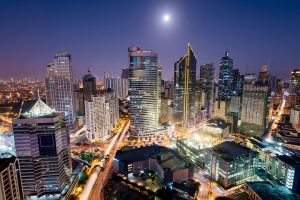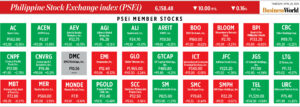FDI slowdown seen for Asia as tariffs roil trade

ASIA is expected to experience a slowdown in foreign direct investment (FDI) as trade shifts in response to US tariff policy, ANZ Research said.
“The collective net FDI into India, Indonesia, Malaysia, the Philippines, South Korea, Taiwan, Thailand, and Vietnam dropped to -0.1% of gross domestic product (GDP) in 2024, marking the weakest outcome since 2012,” it said in a report.
The FDI of ‘net contributor’ economies such as Thailand, South Korea and Taiwan was -1.6% of their GDP last year. This was 30 basis points (bps) below the long-term average,” ANZ said.
“The ‘net recipient’ economies (India, Vietnam, Indonesia, the Philippines and Malaysia) recorded a sharper decline — their total net FDI dropped to 0.7% of GDP in 2024 versus the long-term average of 1.5%.”
The Bangko Sentral ng Pilipinas reported that net FDI fell 20% year on year to $731 million.
In 2024, Philippine FDI net inflows rose 0.1% to $8.93 billion. In December, inflows plunged 85.2% to $110 million.
“This decline is due to a broader downtrend in the region’s inward FDI cycle, which has been brewing for a while and is not due to geopolitical factors alone,” ANZ said.
“A structural uptrend in the region’s outward FDI, even from low per capita income economies, has also contributed to the net FDI slowdown.”
ANZ Research said the main driver of weak FDI is the “stagnation in global trade-to-GDP.”
“Trade or tariff wars hurt global trade, unequivocally posing structural risks to global FDI,” it added.
“The current trade war is much bigger than the one in 2018 — the US now wants to correct bilateral trade imbalances with most of its trading partners (not just mainland China) by deploying universal tariffs as an indiscriminate policy tool.”
Southeast Asia was assigned some of the most punitive tariffs by US President Donald J. Trump, including Vietnam (46%), Thailand (36%), Indonesia (32%) and Malaysia (24%).
The Philippines was assigned a 17% rate, second lowest in the region.
These reciprocal tariffs were put on hold for 90 days, though the baseline 10% is still in effect for most countries.
“However, FDI drivers have also become nuanced. The importance of product sophistication, export promise and service export potential has surpassed that of traditional drivers such as domestic market size, cheap labor, or the quality of regulations.”
“Not all economies in Asia have progressed meaningfully on these fronts in the last decade or so,” it added.
Based on the latest edition of Kearney’s FDI Confidence Index, the Philippines fell three spots to 16th place out of 25 emerging markets. The index ranks markets that are likely to attract the most FDI in the next three years.
“Going forward, manufacturing FDI will likely favor new-age goods, for which capacities are yet to build up to cater rising global demand,” ANZ said.
“The FDI composition itself is expected to skew further towards services, which are rapidly gaining global trade share.”
The report said that to mitigate the impact from these uncertainties, Asian economies must “work harder to create and support ecosystems to attract FDI.”
“Policy focus must shift to supporting factors such as research, intellectual property, labor skills, and export infrastructure.”
“Even so, outward FDI will likely remain on an uptrend, driven by rapid growth of the global service sector, acquisition of strategic resources, and risk mitigation practices among large firms in a fragmented global geopolitical order.”
ANZ also noted that these spillovers from trade tensions could also “re-energize Asia’s intra-region trade that has otherwise stagnated as a share of the region’s total trade in the past decade.”
If the region can shift to “value-creating ecosystems,” this could attract investment in local production, research, and distribution capabilities.
“There is a real second chance for Asia ex-China to attract FDI in the medium term due to the current trade war, as the rift between the US and mainland China is widening with their reciprocal tariffs reaching prohibitive levels.”
“Overall, while the recent FDI trends have been disappointing, it will be imprudent to write off the region’s long-term investment promise, especially amidst a fractious global economic order. While opportunities exist, tasks are cut out, and FDI investors will be discerning.” — Luisa Maria Jacinta C. Jocson




